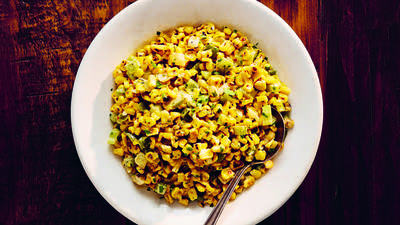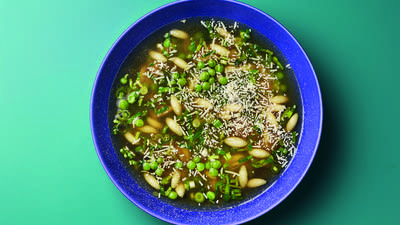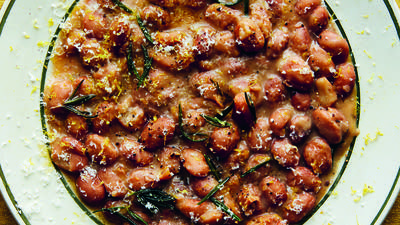
Nothing could be simpler than makin' bacon, the king of all fried meats. How many "vegetarians" have you known who just eat the periodic slab of crisp sautéed hog fat? I rest my case. Bacon is God. To cure your own bacon, plan and shop for ingredients well in advance. You might need to special-order the pork belly from your local butcher or grocery store. You can order curing salt from online retailers such as www.sausagemaker.com; I recommend Insta-Cure #1. In this recipe, I offer three ways to smoke the bacon. If you go the liquid smoke route, use only the real stuff: fake liquid smoke has an unappealing chemical taste. If you choose to smoke the meat on the grill, you'll need some hickory sawdust, which is available in smoking stores or through online retailers. Once the bacon is ready to eat, note that it will be easiest to slice thinly — a must if you like crispy bacon — when it is partially frozen and your knife is very sharp.
Prep ahead: Have on hand 3 tablespoons of real liquid hickory smoke or 5 cups of hickory sawdust, depending on the method you've chosen to smoke the bacon.
Ingredients
2 1/2 to 3 pounds pork belly
1/2 cup sugar
1 tablespoon blackstrap molasses
2 tablespoons kosher salt, plus more as needed
1 teaspoon curing salt
1 teaspoon freshly ground black pepper
Instructions
Rinse the belly and thoroughly pat it dry. Trim off any thin edges so that the piece is one long rectangle. (You can save these excess pieces of belly for making sausage or lard.)
In a small bowl, mix the sugar with the molasses. Then mix in the 2 tablespoons of salt, curing salt, and pepper and rub it evenly into the meat (like a relaxing, porcine spa treatment). Place the meat inside an oversize sealable plastic bag and lay it flat in the refrigerator for 7 days, massaging the liquids that will amass through the bag and flipping it daily.
After 7 days, inspect your bacon. It should be firm to the touch all over, like touching a cooked steak — a sign that it has been cured. If the flesh still feels spongy and soft in spots, massage the meat again with an additional 2 tablespoons salt and check it again after 1 or 2 days.
Once the bacon is fully cured, discard the solids, rinse the meat well, and pat it dry.
The next step to giving bacon that familiar flavor is the addition of smoke.
Fastest: Roasting and Liquid Smoke Preheat the oven to 200 degrees F. Place the belly, fat side up, on a rack over a roasting pan and roast for 2 to 21/2 hours, until the interior temperature of the meat reaches 150 degrees F.
Gently brush the liquid smoke over the entirety of the bacon, covering both sides evenly.
Slowest: Smoking on the Grill Smoke the meat, fat side up, using a 5-cup packet of hickory sawdust, for 3 to 5 hours, until it reaches an internal temperature of 150 degrees F.
Best of Both Worlds: Smoking and Roasting This is my preferred methodology, because I love the flavor of the smoke but often lack the patience for a full grill session. Start smoking your meat, and do so as long as you're able — at least 2 hours is really ideal. Smoke it until you get sick of babysitting the grill and tending to the coals. Finish the meat on a rack over a roasting pan in a 200 degrees F oven until it reaches 150 degrees F inside at its thickest point.
Fry a slice of the bacon and taste. If it needs more smoke flavor, brush a thin layer of liquid smoke on both sides of the slab.
Whichever method you use, when your bacon is ready, slice it as thin (or as thick) as you like it and fry, over medium-high heat, until browned on both sides. Drain on paper towels and enjoy.
How to store it: Bacon can be stored in large slabs, in precut hunks for flavoring beans or other dishes, or in slices, in layers between pieces of parchment paper, and sealed tightly in a freezer storage bag. Refrigerate up to 10 days or keep frozen up to 3 months.
From Jam It, Pickle It, Cure It and Other Cooking Projects by Karen Solomon, Ten Speed Press, © 2009, Karen Solomon.
Before you go...
Each week, The Splendid Table brings you stories that expand your world view, inspire you to try something new, and show how food connects us all. We rely on your generous support. For as little as $5 a month, you can have a lasting impact on The Splendid Table. And, when you donate, you’ll join a community of like-minded individuals who love good food, good conversation, and kitchen companionship. Show your love for The Splendid Table with a gift today.
Thank you for your support.
Donate today for as little as $5.00 a month. Your gift only takes a few minutes and has a lasting impact on The Splendid Table and you'll be welcomed into The Splendid Table Co-op.



